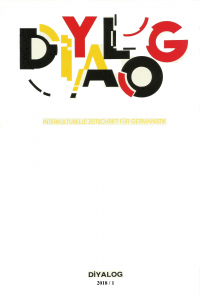Öz
Anahtar Kelimeler
Skopos kuramı kültür ve dil edinci çeviri yaklaşımları işlev odaklı çeviri yeterlik
Kaynakça
- Dizdar, Dilek (2006): “Skopostheorie”, in: Snell-Hornby, Mary / Hönig, Hans G. / Kußmaul, Paul / Schmitt, Peter A. (Hg.): Handbuch Translation, Tübingen: Stauffenburg, S. 104-107.
- Herrmann, Markus (2000): “Kulturspezifische Krankheitskonzepte”, in: Beauftragte der Bundesregierung für Ausländerfragen (Hg.): Handbuch zum interkulturellen Arbeiten im Gesundheitsamt, Berlin, S. 27-30.
- Prunč, Erich (2001): Einführung in die Translationswissenschaft. Band 1: Orientierungsrahmen, Graz: Institut für Translationswissenschaft.
- Reiß, Katharina / Vermeer, Hans J. (1984): Grundlegung einer allgemeinen Translationstheorie, Berlin: Walter de Gruyter.
- Sinner, Carsten (2013): “Probleme und Methoden der Übersetzungswissenschaft”, verfügbar unter: http://www.carstensinner.de/Lehre/uebersetzungswissenschaft/dossiers2013/dossier_stylistique_comparee.docx [Zugriff am 04.02.2018].
- Stolze, Radegundis (2008): Übersetzungstheorien. Eine Einführung, 5., überarbeitete und erweiterte Auflage, Tübingen: Narr.
- Vermeer, Hans J. (1990): Handlungstheorie und Translation. Skopos und Translationsauftrag, 2. Auflage. Translatorisches Handeln 2, Institut für Übersetzen und Dolmetschen (Hg.), Heidelberg, S. 45-68.
- Vermeer, Hans J. (1994): Übersetzen als kultureller Transfer. Übersetzungswissenschaft- Eine Neuorientierung, 2., durchgesehene Auflage. Snell-Hornby, Mary (Hg.), Tübingen: Francke, S. 30-53.
- Vinay, Jean-Paul / Darbelnet, Jean (1995): Comparative stylistics of French and English: A Methodology for Translation, Amsterdam/Philadelphia: John Benjamins.
Die Rolle sprachlicher und kultureller Kompetenz in der Funktionalen Übersetzung. Eine empirische Studie
Öz
Kaynakça
- Dizdar, Dilek (2006): “Skopostheorie”, in: Snell-Hornby, Mary / Hönig, Hans G. / Kußmaul, Paul / Schmitt, Peter A. (Hg.): Handbuch Translation, Tübingen: Stauffenburg, S. 104-107.
- Herrmann, Markus (2000): “Kulturspezifische Krankheitskonzepte”, in: Beauftragte der Bundesregierung für Ausländerfragen (Hg.): Handbuch zum interkulturellen Arbeiten im Gesundheitsamt, Berlin, S. 27-30.
- Prunč, Erich (2001): Einführung in die Translationswissenschaft. Band 1: Orientierungsrahmen, Graz: Institut für Translationswissenschaft.
- Reiß, Katharina / Vermeer, Hans J. (1984): Grundlegung einer allgemeinen Translationstheorie, Berlin: Walter de Gruyter.
- Sinner, Carsten (2013): “Probleme und Methoden der Übersetzungswissenschaft”, verfügbar unter: http://www.carstensinner.de/Lehre/uebersetzungswissenschaft/dossiers2013/dossier_stylistique_comparee.docx [Zugriff am 04.02.2018].
- Stolze, Radegundis (2008): Übersetzungstheorien. Eine Einführung, 5., überarbeitete und erweiterte Auflage, Tübingen: Narr.
- Vermeer, Hans J. (1990): Handlungstheorie und Translation. Skopos und Translationsauftrag, 2. Auflage. Translatorisches Handeln 2, Institut für Übersetzen und Dolmetschen (Hg.), Heidelberg, S. 45-68.
- Vermeer, Hans J. (1994): Übersetzen als kultureller Transfer. Übersetzungswissenschaft- Eine Neuorientierung, 2., durchgesehene Auflage. Snell-Hornby, Mary (Hg.), Tübingen: Francke, S. 30-53.
- Vinay, Jean-Paul / Darbelnet, Jean (1995): Comparative stylistics of French and English: A Methodology for Translation, Amsterdam/Philadelphia: John Benjamins.
An empirical study examining the role of language proficiency and cultural competence in functional translation
Öz
This empirical study examined to what extent students-translators were able to transfer cultural elements in their translations. Within the framework of Skopos Theory (Reiß / Vermeer 1984) and having adopted functional analysis, the study investigated how students-translators with different levels of language proficiency and cultural competence transfer cultural elements from the source text into the target text and if they apply different strategies when dealing with cultural elements in their translations. The study aims to determine if there are differences in the strategies used by the participants and how these differences can be explained with the framework of Skopos Theory.
For this purpose, the study examined the translation process, strategies and product of German-Turkish students-translators. The study looked into adequacy and equivalence between the source and the target texts within the focus on the translation of cultural elements, and then discussed the results within the framework of Skopos Theory.
The findings revealed that there were differences between the strategies and approaches applied by the two groups. Particularly, the students-translators who had acquired the German language in Germany and were more familiar with the culture of the country, occurred to be more successful in transferring cultural elements in their translation. These findings suggest that language proficiency and cultural competence of the participants benefit their translation of cultural elements.
Anahtar Kelimeler
Skopos theory language proficieny cultural competence functional analysis adequacy
Kaynakça
- Dizdar, Dilek (2006): “Skopostheorie”, in: Snell-Hornby, Mary / Hönig, Hans G. / Kußmaul, Paul / Schmitt, Peter A. (Hg.): Handbuch Translation, Tübingen: Stauffenburg, S. 104-107.
- Herrmann, Markus (2000): “Kulturspezifische Krankheitskonzepte”, in: Beauftragte der Bundesregierung für Ausländerfragen (Hg.): Handbuch zum interkulturellen Arbeiten im Gesundheitsamt, Berlin, S. 27-30.
- Prunč, Erich (2001): Einführung in die Translationswissenschaft. Band 1: Orientierungsrahmen, Graz: Institut für Translationswissenschaft.
- Reiß, Katharina / Vermeer, Hans J. (1984): Grundlegung einer allgemeinen Translationstheorie, Berlin: Walter de Gruyter.
- Sinner, Carsten (2013): “Probleme und Methoden der Übersetzungswissenschaft”, verfügbar unter: http://www.carstensinner.de/Lehre/uebersetzungswissenschaft/dossiers2013/dossier_stylistique_comparee.docx [Zugriff am 04.02.2018].
- Stolze, Radegundis (2008): Übersetzungstheorien. Eine Einführung, 5., überarbeitete und erweiterte Auflage, Tübingen: Narr.
- Vermeer, Hans J. (1990): Handlungstheorie und Translation. Skopos und Translationsauftrag, 2. Auflage. Translatorisches Handeln 2, Institut für Übersetzen und Dolmetschen (Hg.), Heidelberg, S. 45-68.
- Vermeer, Hans J. (1994): Übersetzen als kultureller Transfer. Übersetzungswissenschaft- Eine Neuorientierung, 2., durchgesehene Auflage. Snell-Hornby, Mary (Hg.), Tübingen: Francke, S. 30-53.
- Vinay, Jean-Paul / Darbelnet, Jean (1995): Comparative stylistics of French and English: A Methodology for Translation, Amsterdam/Philadelphia: John Benjamins.
Ayrıntılar
| Birincil Dil | Almanca |
|---|---|
| Bölüm | Makaleler |
| Yazarlar | |
| Yayımlanma Tarihi | 30 Haziran 2018 |
| Gönderilme Tarihi | 13 Mart 2018 |
| Yayımlandığı Sayı | Yıl 2018 Cilt: 6 Sayı: 1 |
www.gerder.org.tr/diyalog

